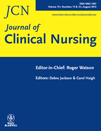Factors affecting nursing staff in practising spiritual care
Abstract
Aim. To examine nurses’ attitudes to practising spiritual care and determine factors associated with nurses’ attitudes to practising spiritual care.
Background. Today, health is no longer viewed as a passive state of being, but as a dynamic process of achieving higher levels of wellness. In practices, nurse has increasingly focused on treating the whole person, including the four domains: physical, mental, social and spiritual. Of these four domains, the spiritual domain is the most neglected in daily nursing practice.
Design. This is retrospective study.
Methods. A convenience sampling was used and 110 nurses completed a structured questionnaire at a public hospital in September 2006.
Outcome measures. Nurses’ demographic data and perceptions and practices scores on spiritual care.
Results. The results showed that nurses who more likely had religious beliefs (p = 0·028), were more likely to be married (p = 0·01), had past hospitalisation experiences (p = 0·009), worked in the obstetrics and gynaecology department (p < 0·001) and had higher perception levels towards spiritual care (p < 0·001) were significantly more likely to be practising spiritual care.
Conclusion. As nurses are with patients all day, they are in a position to safeguard the wholeness and integrity of the patient. As mentioned in the results, there is a positive correlation between spiritual care perceptions and spiritual care practice among nurses, which means that the greater the nurse’s spiritual care perceptions, the more frequently spiritual care is included in that nurse’s practice. This correlation is vital and meaningful; it can drive hospitals to promote nurses’ awareness of spiritual care to improve the quality of their spiritual care practice.
Relevant to clinical practices. To facilitate collaboration between nurses and clergy, it might be beneficial for nurses to communicate more with the clergy, include clergy in patient profile discussions and treat clergy as members of the health care team. Given the influence of the spiritual dimension on the physical realm, it would be more economically viable in the long term to ensure that adequate staffing levels are maintained so that staff has enough time to spend with patients to attend to their spiritual needs.




